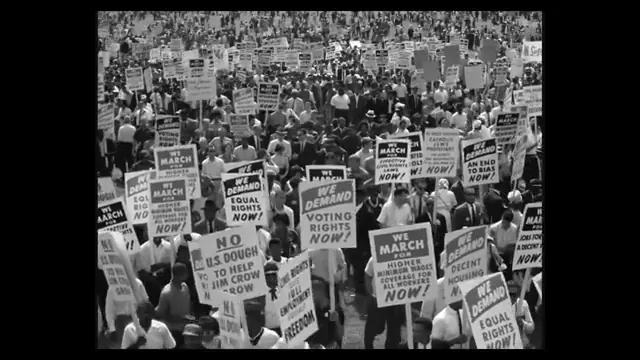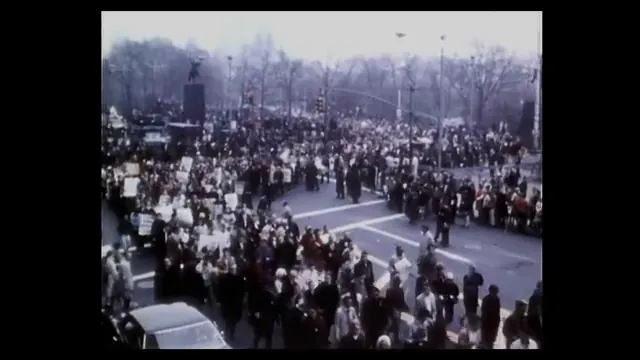🎯 Quick Overview
Trailer
- Director: Sam Pollard
- Genre: Documentary, Biography, History
- Release year: 2020
- Runtime (length): 1h 44min
- IMDb rating: 7.0/10 (2.9K votes)
- Rotten Tomatoes: 98%
😅 Plot Summary – Badly Explained
The FBI, led by a surprisingly dramatic boss, really didn’t like MLK’s whole ‘equality’ thing, so they tried to ruin his life with tape recorders and very strongly worded letters.
🍿 MLK/FBI: Detailed Plot Synopsis
The FBI’s Initial Surveillance
The documentary ‘MLK/FBI’ opens by detailing the inception of the Federal Bureau of Investigation’s interest in Martin Luther King, Jr. under the leadership of J. Edgar Hoover. Initially, the surveillance was rooted in concerns regarding alleged communist ties within King’s inner circle and the broader Civil Rights Movement. This era was marked by intense Cold War paranoia, leading the FBI to view social activism, especially from African American leaders, with deep suspicion. Through newly declassified files and archival footage, the film illustrates how the FBI systematically gathered information, often without clear legal justification. This early phase set the stage for a broader campaign, as the Bureau shifted its focus from national security threats to discrediting King personally and undermining the movement he led.

Escalation to Personal Attacks and Discreditation
As direct evidence of communist influence on King proved elusive, the FBI’s strategy evolved into a more aggressive campaign to undermine his public image and moral authority. The documentary reveals the extent of wiretapping and hidden microphones used to record King’s private life, particularly his extramarital affairs. J. Edgar Hoover, obsessed with King, viewed these personal details as ammunition to destroy his reputation. The film exposes how the FBI attempted to exploit these findings, including sending anonymous letters to King and his wife, Coretta Scott King, urging him to commit suicide. This deliberate psychological warfare aimed to destabilize King and discredit the Civil Rights Movement by painting its leader as morally corrupt. The documentary features interviews with historians, former FBI officials, and King’s associates, providing diverse perspectives on this shameful period.

⚠️ Spoilers and Ending Explained
🎬 Cast & Characters
- Martin Luther King, Jr. (Self (archive footage)): The iconic civil rights leader who became the target of extensive surveillance and harassment by the FBI.
- J. Edgar Hoover (Self – FBI Director (archive footage)): The long-serving FBI Director who relentlessly pursued and attempted to discredit Martin Luther King Jr.
- Andrew Young (Self – Southern Christian Leadership Conference, U.S. House of Representatives, U.S. Ambassador to the U.N., Mayor of Atlanta): A prominent civil rights activist and close confidant of Martin Luther King Jr., providing insight into the movement and King’s experiences.
- Clarence B. Jones (Self – Attorney, Speechwriter for Martin Luther King, Jr): Martin Luther King Jr.’s attorney and speechwriter who offers direct testimony on King’s work and the FBI’s tactics.
- James Comey (Self – Director of the FBI, 2013 – 2017): A former FBI Director who reflects on the historical abuses of power by the bureau against Martin Luther King Jr.
💬 Memorable Quotes
- David Garrow: “The FBI was not a renegade agency. It was fundamentally a part, a core part of the existing mainstream American political order.” – Explaining that the FBI’s extensive surveillance and harassment of Martin Luther King Jr. was systemic and embedded within the government’s mainstream operations.
- James Comey: “I can think of no more shameful episode in the history of the FBI.” – Reflecting on the FBI’s aggressive campaign against Martin Luther King Jr., particularly the sending of a letter encouraging him to commit suicide.
- Martin Luther King Jr.: “The ultimate measure of a man is not where he stands in moments of comfort and convenience, but where he stands at times of challenge and controversy.” – A powerful statement from King himself, emphasizing moral courage and perseverance in the face of the significant challenges and opposition he encountered, including from the FBI.
- Beverly Gage: “We have to remember that this wasn’t just about collecting information; it was about disruption and destruction.” – Highlighting the FBI’s aggressive intent behind their surveillance of civil rights leaders like Martin Luther King Jr., emphasizing their goal was to undermine and discredit, not just observe.
- Ronald Reagan: “In most stories, villains are usually defeated and the ending is a happy one. I can make no such promise with this picture you are about to watch. The story isn’t over…” – An opening quote from an archival film clip, used by the documentary to set a somber and ongoing tone, implying that the struggle against surveillance and injustice continues.
💰Box Office
- Budget: N/A
- Domestic Gross: $45,200
- Worldwide Gross: $91,833
💥 MLK/FBI Reviews
Personal Review
Wow, *MLK/FBI* really hit me hard. I thought I knew a lot about Dr. King and the Civil Rights era, but this documentary peeled back layers of a story I only thought I understood. Seeing the sheer obsession J. Edgar Hoover and the FBI had with King, trying to dismantle his image and the movement, was just chilling. What resonated most was how it wasn’t just about surveillance, but an active, malicious campaign. The thought of a government agency sending a suicide letter to one of the greatest moral leaders in history is something I can’t quite shake. It made me feel a mix of anger and profound sadness for what MLK endured privately while fighting for public justice. The way they used only archival footage, with the historians’ voices as narration, was brilliant. It felt like I was truly transported back in time, witnessing history unfold without any modern distractions. This isn’t just a film; it’s an important historical document that makes you question everything you thought you knew about power and dissent. A must-watch for anyone who wants a deeper understanding of American history.
- Who would enjoy:
- “History enthusiasts, particularly those interested in American history and the Civil Rights Movement.”
- “Documentary film fans seeking insightful and investigative storytelling.”
- “Viewers interested in the legacy of Martin Luther King, Jr. and the intricacies of governmental power.”
- “Students and academics studying civil liberties, surveillance, and social justice.”
- Content warnings ⚠:
- “Historical themes of racism and systemic oppression.”
- “Discussions of extensive government surveillance and harassment.”
- “Sensitive content related to attempts to discredit a public figure through personal information.”
Professional Reviews
- Film Weekly: “Sam Pollard’s MLK/FBI is a masterclass in historical documentary, chillingly revealing the depths of government overreach. It powerfully uses archival footage, weaving a narrative that’s both educational and deeply unsettling, reminding us of the fragility of civil liberties.
- Cinema Today: “This documentary is a crucial, eye-opening experience. It doesn’t just chronicle events; it immerses you in the paranoia and calculated efforts to dismantle the Civil Rights Movement. The decision to use voiceovers without talking heads enhances the historical immersion beautifully.
- IndieWire: “MLK/FBI is a testament to the power of declassified information, shedding light on a dark chapter of American history. It’s a sobering look at how those sworn to protect could actively work to undermine an iconic figure, offering invaluable insights into past abuses of power.
Audience Reactions
Many were shocked by the aggressive and personal nature of the FBI’s campaign against MLK.: Viewers widely praised the film’s thorough research and the effective use of archival footage for its immersive historical experience.
The documentary sparked discussions on government overreach and the enduring fight for civil liberties.: Audiences appreciated how the film humanized MLK, showing his struggles and resilience against immense pressure, and found it incredibly timely.
Overall Consensus: MLK/FBI is lauded as an essential, eye-opening documentary that thoroughly explores the FBI’s unsettling surveillance and harassment of Martin Luther King Jr., prompting critical reflection on historical abuses of power and their contemporary relevance.
Awards
🛠️ Behind the Scenes
- “The documentary was officially released on January 15, 2021, which would have been the Rev. Dr. Martin Luther King, Jr.’s 92nd birthday, a deliberate choice to honor his legacy.”
- “The film makes extensive use of newly discovered and declassified FBI files and archival footage, with expert commentary provided through voiceovers rather than visible talking heads for much of the film, creating an immersive historical experience.”
- “The director, Sam Pollard, chose to primarily use unseen historical footage and photographs, relying on audio-only interviews with historians and individuals who knew King, with their identities only revealed in the closing credits, to keep the focus squarely on the historical narrative.”
- “The documentary highlights that the full audio tapes gathered by the FBI on Martin Luther King Jr.’s private life are not scheduled for public release until 2027, underscoring the ongoing nature of revelations surrounding this period.”
🖥️ How to Watch MLK/FBI?
MLK/FBI is a powerful documentary that chronicles the US government’s surveillance and harassment of Martin Luther King, Jr. You can typically find it available for rent or purchase on major video-on-demand platforms. Check services like Prime Video, Apple TV, Google Play, YouTube, or Vudu for digital access. Availability may vary by region, so it’s always recommended to check your preferred streaming service directly for the most up-to-date options.

🎥 Similar Movies
If you enjoyed MLK/FBI, you might like these similar films:
- I Am Not Your Negro (2016): Explores the history of race in America through the unfinished work of James Baldwin, utilizing archival footage and a poetic narrative style that resonates with ‘MLK/FBI”s approach to historical figures and themes of racial injustice.
- Citizenfour (2014): A powerful documentary that exposes modern government surveillance programs and the fight for privacy, paralleling the themes of state intrusion, secrecy, and civil liberties found in ‘MLK/FBI’.
- Selma (2014): A historical drama focusing on Martin Luther King Jr.’s pivotal voting rights marches, providing a narrative and emotional complement to the documentary’s portrayal of King’s public life and the significant struggles he faced.
- 13th (2016): An insightful documentary that explores the history of racial inequality in the United States, linking the legacy of slavery to modern mass incarceration, offering a broader and deeper context to the systemic issues highlighted in ‘MLK/FBI’.
- The Thin Blue Line (1988): A groundbreaking documentary that pioneered a new style of investigative filmmaking, exposing a miscarriage of justice within the American legal system and demonstrating the power of film to challenge official narratives, akin to ‘MLK/FBI”s aim to uncover government misconduct.
🛒 MLK/FBI Related Products
- Bearing the Cross: Martin Luther King, Jr., and the Southern Christian Leadership Conference: David J. Garrow’s Pulitzer Prize-winning biography offers a comprehensive and deeply researched account of MLK’s life and the Civil Rights Movement, including the intense pressures and surveillance he faced.
- Eyes on the Prize: America’s Civil Rights Years (DVD/Blu-ray Collection): This iconic, Emmy Award-winning documentary series is a comprehensive chronicle of the Civil Rights Movement from 1954 to 1985, featuring extensive archival footage and interviews.
- MLK/FBI Official Documentary Poster: A high-quality print of the official movie poster, featuring stark imagery that captures the film’s themes of surveillance and defiance.
- The King Center Virtual Tour & Educational App: An interactive mobile application offering a virtual tour of The King Center, digital archives of Dr. King’s speeches, writings, and historical context. Includes educational modules on the Civil Rights Movement.
🎧 Soundtrack
MLK/FBI features a captivating soundtrack that enhances the movie’s atmosphere and emotional impact. Here are some notable tracks:
- “The Bureau’s Shadow (Main Theme)” – performed by Original Film Score
- “King’s Oratory (Archival Speeches)” – performed by Martin Luther King, Jr.
- “Newsreel Era (Historical Soundbites)” – performed by Various Archival Recordings
- “A Nation Divided (Period Underscore)” – performed by Original Film Score
You can find the complete soundtrack on Amazon Music and Apple Music.
🤨 FAQ
Yes, ‘MLK/FBI’ is a critically acclaimed documentary film directed by Sam Pollard. It explores the extensive surveillance and harassment of Martin Luther King, Jr. by the Federal Bureau of Investigation under J. Edgar Hoover.
‘MLK/FBI’ delves into the shocking true story of the US government’s campaign to discredit and undermine Civil Rights leader Martin Luther King, Jr. using newly declassified files. It exposes the FBI’s wiretapping, attempts to exploit King’s personal life, and its broader efforts to suppress the Civil Rights Movement.
The full FBI wiretap recordings of Martin Luther King, Jr. are sealed by court order and are scheduled to be publicly released in 2027.
Yes, the documentary directly addresses the FBI’s attempts to use surveillance of Martin Luther King, Jr.’s personal life, particularly his extramarital affairs, to discredit him. It discusses the infamous anonymous letter sent to King and his wife by the FBI.
🔥 Bonus Content
How the FBI Tried to Intimidate Martin Luther King Jr. – Drunk History
Want a hilariously accurate summary of the FBI’s antics against MLK? This ‘Drunk History’ episode is seriously funny and gives you the core story behind the movie in a way you won’t forget. I loved how it makes a tough subject so accessible!
Quickie: Get the Hell Out, Nomadland, MLK/FBI
Curious what a respected critic thinks about ‘MLK/FBI’? This quick review from YMS dives into the film’s strengths and weaknesses, giving you a sharp take on whether it’s worth your time. I always find his reviews super insightful!
✨ Rate
There are no reviews yet. Be the first one to write one.





